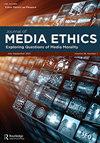Comment Sections and the Ethical Demands of Democracy
IF 0.9
3区 哲学
Q3 COMMUNICATION
引用次数: 0
Abstract
The decision of some online news platforms to eliminate comment sections is both understandable and frustrating. It is understandable as one does not have to read far into comment sections to see democracy at its worst. Commenters post all sorts of things, many of which are irrelevant to the story at hand, untruthful to what many might accept as the facts of the story or situation, and hurtful or offensive to other commenters. Too much of the comment section risks being taken over by harmful and ill-informed opinion. Yet Yahoo!’s decision (and those of the other platforms pursuing similar courses of action) is ultimately disappointing because it gives up on a central tenet of democracy: the idea that we should be able to talk to other citizens about ideas that matter to our lives, and that we should engage in the project to cultivate this ability more and more through new instances of practice. This worry about Yahoo!’s decision in this case strikes at a deeper concern – the important but contested ethical demands of democratic life. The ideals of democracy consequently inform what we expect of the institution of journalism. Many discussions of democracy often focus, explicitly or implicitly, on the decision-making procedures implied by this term. How are laws made, or just decisions reached? Are all included in these procedures, or are all included in the voting that elects those who take part in these decision processes? Perhaps this notion of democracy as a decisionmaking procedure evokes the idea of an informed citizenry, leading to the entailment that media should, ideally, help create informed and knowledgeable voters or citizens. The center of gravity to democracy and its relationship to the news media, on this reading, lies in the act of informing through truthful information that matters to public decision making. There is another way into the idea of democracy, and with it, the troubles that Yahoo!’s decision portends. Taking our lead from the American philosopher John Dewey, we can start with the idea that democracy denotes a habit or way of communicating with others; given the fact that our interactions with others spread throughout the timespan of our lives and do not occur only at periodic moments of political decision making, one can see why Dewey (1988) calls democracy a “way of life.” Writing in 1939 in the shadows of an approaching world war, he notes: “I am inclined to believe that the heart and final guarantee of democracy is in free gatherings of neighbors on the street corner to discuss back and forth what is read in uncensored news of the day and in gatherings of friends in the living rooms of houses and apartments to converse freely with one another” (1988, p. 227). Why does he postulate this everyday and communicative notion of democracy? It is partially because democracy cannot be envisioned as a silent community of happy individuals; it entails noise, disagreement, laugher, persuasion, and heated utterances. Dewey’s stance is grounded on what he calls “the fundamental principle of democracy,” namely the belief that “the ends of freedom and individuality for all can be attained only by means that accord with those ends” (Dewey, 1987, p. 299). Democracy is about communities or groups of individuals that share common interests – if not many views and values – and that freely communicated with each other. Of course, many of those interactions could be heated and not simply displays of agreement and friendship, and the holding of shared interests is often评论区与民主的伦理要求
一些网络新闻平台取消评论区的决定既可以理解,也令人沮丧。这是可以理解的,因为人们不需要深入阅读评论区就能看到最糟糕的民主。评论者发布了各种各样的东西,其中许多与手头的故事无关,与许多人可能接受的故事或情况的事实不符,并且对其他评论者造成伤害或冒犯。太多的评论区冒着被有害和不了解情况的观点所占据的风险。然而,雅虎facebook的决定(以及其他采取类似行动的平台的决定)最终令人失望,因为它放弃了民主的一个核心原则:我们应该能够与其他公民谈论与我们生活有关的想法,我们应该通过新的实践案例参与到培养这种能力的项目中来。这种对雅虎的担忧!最高法院在此案中的决定触及了一个更深层次的问题——民主生活中重要但有争议的道德要求。因此,民主的理想决定了我们对新闻机构的期望。许多关于民主的讨论往往或明或暗地集中在这个术语所隐含的决策程序上。法律是如何制定的,或者只是决定是如何达成的?是否所有人都包括在这些程序中,还是所有人都包括在选举参与这些决策过程的人的投票中?也许这种将民主作为一种决策程序的概念唤起了知情公民的概念,从而导致媒体应该在理想情况下帮助创造知情和知识渊博的选民或公民。在这种解读下,民主及其与新闻媒体关系的重心在于通过对公共决策至关重要的真实信息提供信息。民主的概念还有另一种方式,随之而来的是雅虎(Yahoo!这一决定预示着。以美国哲学家约翰·杜威(John Dewey)为例,我们可以从民主意味着一种与他人沟通的习惯或方式开始;考虑到我们与他人的互动贯穿于我们一生的时间跨度,而不仅仅发生在政治决策的周期性时刻,我们可以理解为什么杜威(1988)称民主为一种“生活方式”。1939年,在即将到来的世界大战的阴影下,他写道:“我倾向于相信民主的核心和最终保障是邻居们在街角的自由集会,他们来回讨论当天未经审查的新闻,以及朋友们在房子和公寓的客厅里聚会,彼此自由交谈”(1988,第227页)。为什么他假设了这种日常的、交流的民主概念?部分原因是,民主不能被设想为一个由幸福的个人组成的沉默的社区;它包含了噪音、分歧、笑声、劝说和激烈的话语。杜威的立场建立在他所谓的“民主的基本原则”之上,即相信“所有人的自由和个性的目的只有通过与这些目的一致的手段才能达到”(杜威,1987,第299页)。民主是指拥有共同利益的社区或个人群体——如果不是许多观点和价值观的话——并且彼此自由交流。当然,其中许多互动可能会很激烈,而不仅仅是表示同意和友谊,共同利益的持有往往是
本文章由计算机程序翻译,如有差异,请以英文原文为准。
求助全文
约1分钟内获得全文
求助全文

 求助内容:
求助内容: 应助结果提醒方式:
应助结果提醒方式:


